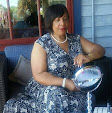

Memory Monday- A Death and a Birthday
It was not my intention to write about Michael Jackson but I find myself led to say a few words. His sudden tragic death on June 25, 2009 has brought a lot of memories and no doubt dominates many blogs, columns, and essays this month.
I, like many others feel as if I grew up with Michael Jackson and his brothers. The Jackson 5 burst on the scene in 1969, the year I was 18 and in college. I remember a house party in East Oakland where several of us were partying hearty and the hit song, “The Love You Save May be Your Own.” We stomped all night singing and dancing to that tune. It occurred to me that Michael Jackson was generational. My daughter Rebecca who turned 30 on June 27 also remembers Michael Jackson. She was three years old when Thriller came out. One of the songs on that album was “Beat It.” One day she was at her babysitter, a close family friend and church member, Mary’s house. She was going around the house singing, “Beat it, beat it, nobody wants to be defeated.” Mary told Rebecca, thinking she was redirecting a three-year old’s waywardness, “Why don’t you sing a church song?" Rebecca’s quipped, “We aren’t in church.” We still laugh about that years later and I reminded Rebecca of that the other night. She remembers singing and dancing to the Thriller album.
Sunday at Rebecca’s birthday Spa Brunch, the talk seemed to always veer back to Michael Jackson, his life, the gossip, and of course, the music. Yes, Michael was tragic, there were many accusations and reportedly the abuse of prescription drugs but I won’t get into that side of it. I choose to remember the old Michael, the one who sang with his brothers and took Motown by storm; the one who could dance like a gazelle, who made such genius videos such as Smooth Criminal and Remember the Time, who could unite the world with Black or White and We are the World.
Gone but not forgotten
The Love You Save
http://www.youtube.com/watch?v=nW_-4rLaHM8




